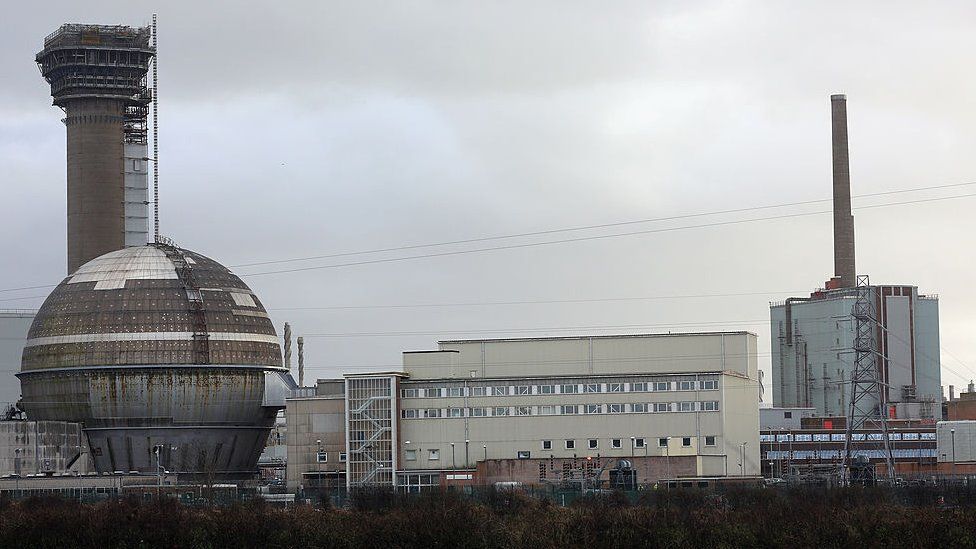Sellafield boss hits back at safety failure claims
- Published

Sellafield is widely regarded as Western Europe's most hazardous nuclear site
The chief executive of Sellafield has hit back at reports that computer systems at the nuclear site in Cumbria have been hacked.
Euan Hutton told the BBC there was no evidence of Sellafield's IT networks having been targeted by groups linked to foreign governments.
He also rejected allegations of serious safety failings at the plant.
Mr Hutton was responding to claims in a series of articles published in the Guardian earlier this month.
Sellafield, a sprawling facility on the Cumbrian coast, is widely regarded as Western Europe's most hazardous nuclear site.
In the past, its activities included generating electricity and reprocessing spent fuel. Now it is mainly used for the treatment and storage of nuclear waste.
It employs 11,000 people - many of whom are engaged in maintaining or decommissioning redundant buildings and equipment.
It is also home to the UK's civil plutonium stockpile, with 140 tonnes of the material stored there. Security is extremely tight.
Euan Hutton said there was "absolutely no evidence" of any kind of attack
Earlier this month, the Guardian reported, external that Sellafield's IT systems had been hacked into "by cyber groups linked to Russia and China".
It suggested that those networks had been infected with malware, potentially compromising crucial information about the plant's most sensitive activities.
But in an exclusive BBC interview, Mr Hutton said there was "absolutely no evidence" of any kind of attack, whether from state actors or elsewhere.
"We've got very robust multi-layer protection systems that would indicate if anything like that had happened," he said.
"We also have a 24/7-staffed cyber-security operations centre. And their job is to protect the system, to monitor the system to ensure that that never happens."
Asked whether he could categorically reassure the public that there had been no hack, he replied: "Yes, because our systems would indicate if there had been, and there has not."
The Office for Nuclear Regulation (ONR), which oversees the industry, agreed there was no evidence Sellafield's networks had been penetrated by state actors.
But in a statement, it added: "Sellafield Ltd is currently not meeting the high standards that we require in cyber security, which is why we have placed them under significantly enhanced attention."
Asked whether he accepted there were weaknesses in Sellafield's cyber-defences, Mr Hutton replied: "Yes, because we've agreed with the regulator a plan to improve and eradicate those weaknesses."
An open-air pond at Sellafield still contains hundreds of tonnes of waste
The plant operator has also come under fire over the safety risks posed by some of its ageing facilities, two of them in particular.
The first is a vast, open-air pond, built in the 1950s to store and cool used nuclear fuel. It still contains hundreds of tonnes of waste, along with a large quantity of radioactive sludge, accumulated over decades.
Although efforts to clean up the pond are under way, using a variety of robot submarines, concerns have been expressed for years about cracks in its ageing concrete structure and the potential consequences of an accident.
"It's an open-air pond that does have a number of cracks," Mr Hutton admitted.
"But we know where all of those cracks are, we monitor those cracks, or operators check those. And we understand what we would do should they get worse."
A giant storage silo is leaking contaminated water
The second building is a giant storage silo, used to store some 11,000 cubic metres of highly radioactive scrap. It has been leaking contaminated water into the ground for several years, but because the leak is deep underground and inaccessible, it cannot be repaired.
Sellafield's solution is to empty the silo, and take the waste away for storage elsewhere. But this is a painstaking process, carried out by operators using a remote grab from behind a protective thick leaded-glass window. It is expected to take many years.
Mr Hutton insisted action was being taken as rapidly as possible.
"We are straining every sinew to accelerate safely what we have to do to stop the leak, and the best way to do that is to remove the waste safely," he said.
He insisted safety concerns were "absolutely not" being ignored or swept under the carpet.
He also rejected allegations that a toxic and potentially dangerous workplace culture of bullying, sexual harassment and drug taking existed on site.
This is not the first time such accusations have been levelled at the company.
But Mr Hutton said that while he did not deny historic concerns, he did not recognise "the description that has been put out there".
"That is not the company I work for. And those are not the people I work with. We do not accept bullying, harassment or racist behaviour," he said.
Nevertheless, the reports have clearly reignited longstanding concerns about Sellafield.
Two weeks ago, the Energy Secretary, Claire Coutinho, told the ONR that the allegations regarding cyber-security, safety and workplace culture were serious and required urgent attention.
The GMB union has also written to Ms Coutinho, suggesting that the allegations "came as no surprise" to its members.
Labour's shadow energy security and net zero secretary Ed Miliband called on the government to "provide assurances" about the plant.
Related Topics
- Published5 December 2023
- Published27 October 2023